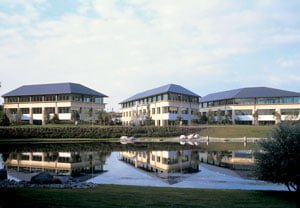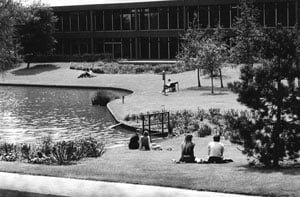
Businesses both shape and respond to changes in the competitive environment. In the early 1980s, the impact of information technology was changing the nature of commercial life. At the same time, major improvements were being made to the UK’s transport infrastructure and people began to place a greater emphasis on maximising efficiency through high quality working environments. Arlington Securities responded to these changes by recognising the need to develop a new kind of location in which all kinds of businesses could thrive – the business park.
Arlington Securities Plc is now the recognised leader in the business park sector and has created the largest network of business parks throughout the United Kingdom, providing accommodation for 360 organisations which employ almost 30,000 people. Organisations must continue to monitor the market environment in which they operate in order to survive. To understand how Arlington Securities should continue to respond effectively to environmental changes, it is important to know what factors have made it what it is today.
This case study outlines the need for organisations to develop strategies which respond to changes in the external environment, not only to become successful but to remain so. It examines the strategic rationale behind Arlington Securities’ decision to reposition its property business from being solely a developer/trader to a full service provider
demonstrating total commitment to customers. Arlington business parks offer organisations:
- optimum access to transport systems
- an out of town location in an attractive environment
- a full range of support services
- a range of occupational options from a finished building to land sales
- buildings that can be occupied on either a leasehold or freehold basis
- land purchase for organisations to develop their own premises.
The business park concept offers flexibility to occupiers. Businesses choosing a leasehold option will value the advantages of releasing or retaining core business capital previously tied up in the property. Alternatively, businesses choosing a freehold option will have made a sound property investment. Business park developers can, to some extent, control the rate of supply of their product and in doing so, bring some stability to their prices. The sheer scale and scope of Arlington’s development programme across seventeen business park locations allow it to provide services that other developers cannot supply at an affordable price, giving Arlington Securities a distinct competitive advantage within its market sector.
Supply chain economics

A supply chain exists for all goods and services. For some services, the supply chain may be complex and have many different stages, so goods and services have to be sourced from many different suppliers. Arlington Securities has become a full service provider and this has simplified the supply chain for Arlington’s customers, i.e. customers contact Arlington, instead of having to deal with a number of suppliers for each different service. Arlington provides the whole package of services for its customers through a process of forward vertical integration. Simplification of the supply chain not only reduces the number of suppliers its customers have to use but also helps them to benefit from savings that
Arlington can provide.
Arlington business parks attract leading national and international organisations. Kumho, the Korean tyre distributor has recently acquired one of Arlington’s speculative buildings on a sixteen year leasehold agreement. The Kings Court development in Birmingham will house Kumho’s European Technical Centre and has been chosen primarily for its superb communication links by road, rail and air.
Chemtek, one of the country’s leading manufacturers and distributors of chemical cleaning products, has relocated to Arlington’s Coventry business park. Chemtek has chosen a freehold site where it will develop its headquarters. Chemtek chose an Arlington business park because of the opportunities Arlington offered for expansion. Vodafone has recently increased its freehold space by purchasing two acres of land from Arlington Securities and now occupies several properties in the park. Perhaps the most significant endorsement of Arlington’s leadership in business park development has been the appointment of Arlington by TAG McLaren to manage the development of its headquarters.
Not surprisingly, Arlington has become the only commercial property developer with a commonly accepted brand name. A reputable brand image promotes wider acceptability of a product, fosters loyalty and contributes to providing organisations with a stable product. Some people say that branding gives consumers an assurance that they are purchasing a quality product on which they can rely. Arlington business parks are known throughout the property market. Occupiers and investors value the quality of Arlington’s product for the benefits it provides to both business operations and investment value. Arlington Securities has recently been approved by a leading certification body to international quality standard ISO9001.
Developing strategies
Strategy is concerned with the direction an organisation wishes to take in the long term and the types of action that the organisation should be taking to achieve its more specific objectives. Arlington’s stated corporate objective is to:
‘Build on our reputation for quality by combining our areas of expertise to develop and deliver a unique range of property solutions to our customers and further reinforce our brand leadership.’
A strategic analysis provides a basis for considering the strategic options available to an organisation. Organisations need to understand and continually monitor key changes which face them currently, as well as try to predict changes that may affect them in the future. This helps them to maximise their efficiency and remain competitive.

An approach to strategic analysis which examines the relationship between the organisation and its environment is known as a S.W.O.T. analysis. This examines both internal and external elements focusing on the Strengths, Weaknesses, Opportunities and Threats facing an organisation at a given time. Strengths and weaknesses are internal to the organisation and opportunities and threats relate to the external environment in which the organisation operates.
The aim of a S.W.O.T. analysis is to identify the extent to which an organisation is capable of meeting the demands of environmental changes. As a result of carrying out a S.W.O.T. analysis, an organisation will develop strategies, allowing it to build on its strengths, minimise its weaknesses, seize its opportunities and take steps to eliminate or minimise its threats.
SWOT analysis
Arlington’s strengths

Arlington Securities’ main strengths lie in the quality of its product, its brand leadership and its experience in business park development. Arlington Securities has maintained its competitive advantage by adopting a differentiation strategy. Differentiation is not simply concerned with giving a product differing attributes to that of competitors, but in providing differences that customers can see and will value. It is also concerned with providing the sort of quality that rivals find difficult to match. Maintaining a competitive advantage is likely to come from four main areas in which Arlington excels: technical superiority, quality, support services and better value for money.
Arlington’s weaknesses
All organisations must recognise their potential weaknesses or vulnerabilities. Arlington Securities’ assets are potentially vulnerable to fluctuations in the property market. An asset is what an organisation owns or is owed. Assets are usually considered in terms of their degree of liquidity. When Arlington Securities buys land for development, it will dispose of large amounts of its most liquid asset – cash. When Arlington buys land for development, it does so by incurring the capital expenditure. Arlington’s assets then become illiquid, because they are more difficult to convert back into cash quickly. If it takes too long for Arlington to either sell or lease the land and buildings it has developed, too many of Arlington’s assets become tied up as illiquid assets. Therefore, if the property market is slow, it may be difficult for Arlington to meet its liabilities. Liabilities and borrowings are what an organisation owes to third parties.
Arlington’s threats
When an organisation, such as Arlington, is seen as the brand leader, competitors will attempt to copy and improve on the product or service. Therefore, Arlington must continue to monitor its performance to remain ahead of its competitors. Arlington must also prepare for government imposed threats such as increased interest rates. An increase in interest rates may:
- deter customers from obtaining loans to invest in property development
- and increase interest rates on loans Arlington Securities has made to finance the development.
Arlington’s opportunities
Arlington Securities recognised that it needed to develop a financial strategy to create a more balanced company which was less vulnerable to the risks associated with the peaks and troughs of the property market. Arlington realised that it needed to establish a dependable income stream, in which current assets are well-balanced against current liabilities.
Arlington’s brand leadership, experience and reputation for quality has provided the opportunity to move away from being solely a developer/trader and further expand its service provision into investments and full support services while retaining its development role. Arlington has also identified an opportunity for expansion into Europe, where the concept of business park development is in its infancy.
Responding to change

Arlington Securities is building on its strengths, by using its brand leadership and experience to expand its services. As part of its commitment to focus on its customers, Arlington has rebranded the company and its parks to reflect a softer and more direct image.
To achieve its aims, Arlington has rationalised its organisation into five distinct operating divisions. This has given the organisation greater flexibility and the ability to become more focused in different areas of its business operations. Dividing an organisation into divisions according to the product or service it provides is advantageous because each sector then concentrates purely on its own market area. Having distinct operating divisions also allows the organisation to assess the profitability and effectiveness of each sector. These moves will enable Arlington to establish a sensible ratio of working capital. (Working capital is important as it provides a stream of revenue that may be required in order to meet liabilities quickly. It is calculated by subtracting current liabilities from current assets.) Distinct operating divisions also enable staff to specialise in their own areas of expertise which ensure the quality of product and a greater commitment to customers.
Arlington Securities is now comprised of:
Arlington Property Developments: Arlington Property Developments will continue to provide environments in which businesses can thrive through developing and marketing Arlington’s national portfolio of business parks. It will continue to offer a range of occupancy and building options as well as land sales.
Arlington Business Services: Arlington Business Services will offer a total workspace solution to its customers. It will provide services in exchange for an all-in-one charge, resulting in occupiers having a transparent view of the total cost of their premises. The range of services will include the move to a business park, the design and installation of IT services, the bulk purchase of utilities such as gas, water, power and communications, as well as gardening, catering and general facilities. There is also the opportunity for companies to take shorter leases where preferred.
Arlington Development Management: Arlington’s Development Management division has evolved as a result of the company’s commitment to quality in the business park environment. Arlington has continued to develop its ability to achieve best practices in materials as well as in methods. It will build on its expertise in development management not just in its own schemes but in providing development management expertise to coordinate the design and construction of facilities for others on the land of their choice.
Arlington Property Investments: Arlington Property Investments will create an environment in which Arlington can generate its own income to ensure smooth growth over the long term. Because Arlington produces a quality product which brings excellent revenues, Arlington has attracted 37 institutional investors to its product and has also built an investment portfolio with a current value of £200 million.
Arlington International Developments: Arlington International Developments will look for European opportunities for business park development. Arlington aims to link its expertise and experience to the local knowledge of a partner to add maximum value to this venture.
A seamless, integrated service: Although Arlington has five distinct operating divisions, the different parts of the business work together to provide a seamless, integrated service product. Arlington markets a combined package, i.e. the customer buys one product from one supplier, with Arlington managing everything from the construction of the building to installing the computer systems and furniture.
Conclusion

Arlington has implemented a strategy that will build on its strengths, minimise its weaknesses, allow it to seize opportunities and minimise its threats. The move for Arlington to expand its role from being solely a developer/trader to a full service provider has arisen from the belief that it could offer its customers more than the property market may lead them to expect. Arlington has created a customer focused environment which responds to the changing expectations of businesses. Careful strategic analysis and implementation have ensured that Arlington Securities will maximise its efficiency, retain its competitive advantage and build an exciting future.
